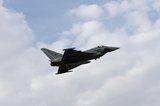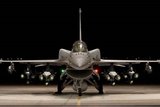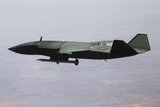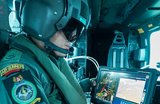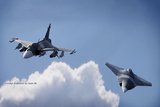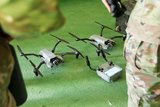USN and RAAF to receive more Poseidon aircraft
USN P-8A multi-mission maritime patrol aircraft. (Photo: Boeing)
The USN is procuring 11 additional P-8A Poseidon long-range anti-submarine and anti-surface warfare aircraft from Boeing for $1.7 billion, the manufacturer announced on 31 March.
Two of these Poseidons will be supplied to the Royal Australian Air Force (RAAF) as a partner in the P-8A programme.
The latest contract will bring to 114 the total number of P-8As in the USN inventory, plus 14 bought by the RAAF via the FMS programme.
Other orders for the P-8A (or variants thereof) have come from India, New Zealand, Norway, Saudi Arabia, South Korea and the UK.
Poseidon can carry weapons such as the MK 54 torpedo or AGM-84 Harpoon anti-ship missile in a bomb bay or externally mounted on pylons. It has two weapons stations on each wing and can carry 129 sonobuoys. The aircraft also features an in-flight refuelling system.
As part of our promise to deliver comprehensive coverage to our Defence Insight and Premium News subscribers, our curated defence news content provides the latest industry updates, contract awards and programme milestones.
Related Programmes in Defence Insight
P-8A Poseidon - Additional (US)
P-8 Poseidon (13-14) [Australia]
Related Equipment in Defence Insight
More from Air Warfare
-
![World Defense Show 2026: L3Harris to achieve full-rate production of Viper Shield soon]()
World Defense Show 2026: L3Harris to achieve full-rate production of Viper Shield soon
L3Harris has completed the production candidate software load for its Viper Shield airborne electronic warfare system and is conducting sea trials with its VAMPIRE counter-drone system.
-
![Singapore Airshow 2026: CCA manufacturers eye growing opportunities in Asia-Pacific]()
Singapore Airshow 2026: CCA manufacturers eye growing opportunities in Asia-Pacific
Companies offering collaborative combat aircraft say there is a massive potential for countries adopting the capability in the Asia-Pacific region.
-
![Singapore Airshow 2026: Airbus-RSAF H225M teaming tests point to future scalability]()
Singapore Airshow 2026: Airbus-RSAF H225M teaming tests point to future scalability
The tests between a Republic of Singapore Air Force H225M and Airbus Flexrotor uncrewed aerial system were designed to allow the crew to receive and process real-time data from the UAS while maintaining direct command and control.
-
![Singapore Airshow 2026: Saab eyes “share” in future fighter market, targets 2027 CCA demo flight]()
Singapore Airshow 2026: Saab eyes “share” in future fighter market, targets 2027 CCA demo flight
The Swedish government is expected to make a decision on the next steps of the Future Fighter System Concept programme by 2030, with the current second phase focusing on technology knowledge expansion and demonstration flights.
-
![Singapore Airshow: Red Cat ramps up portfolio development amid “key” APAC opportunities]()
Singapore Airshow: Red Cat ramps up portfolio development amid “key” APAC opportunities
In the wake of its 1,842% year-on-year revenue increase in Q4 2025, Red Cat sees mass opportunities in the Asia-Pacific region as the company eyes an ongoing production increase and market growth.









